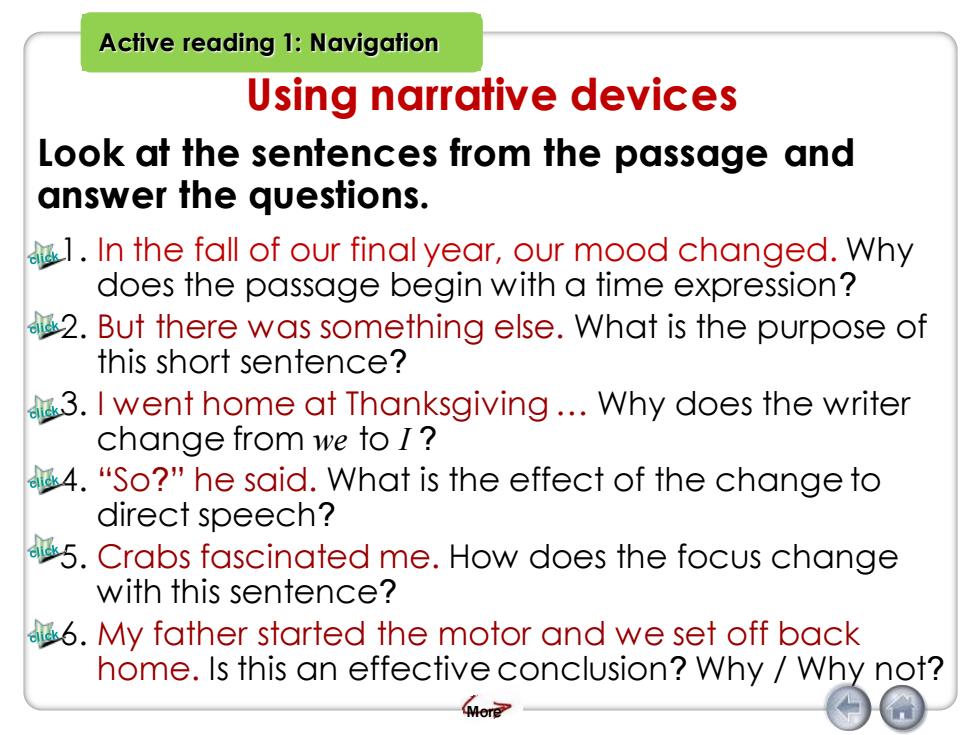
Active reading 1:NavigationUsing narrativedevicesDo you know how a writer sparks interest andencourages a reader to read on?Tochangebetween description,narrationofevents,anddialogue.Inthispassage,thechangeis oftensignaledbyanarrativedevice:comes at the beginning ofa sentencetheparagrapha time expressionprepares the reader for thedirectspeechrestoftheparagraphTheonlyexceptionisthefinal sentenceleft to the reader to think about what happens next(More
Using narrative devices More Active reading 1: Navigation To change between description, narration of events, and dialogue. Do you know how a writer sparks interest and encourages a reader to read on? In this passage, the change is often signaled by a narrative device: ⚫ a sentence ⚫ a time expression ⚫ direct speech prepares the reader for the rest of the paragraph The only exception is the final sentence left to the reader to think about what happens next comes at the beginning of the paragraph

Activereading1:NavigationUsing narrative devicesLook at the sentences from the passage andanswer the questions.dll . In the fall of our final year, our mood changed. Whydoes thepassage begin with a time expression?dla2. But there was something else. What is the purpose ofthis short sentence?dla3. I went home at Thanksgiving ... Why does the writerchange from we to I ?ellk4. "So?" he said. What is the effect of the change todirect speech?d5. Crabs fascinated me. How does the focus changewith this sentence?dllk6. My father started the motor and we set off backhome. Is this an effective conclusion? Why / Why not?More
Using narrative devices More Look at the sentences from the passage and answer the questions. 1. In the fall of our final year, our mood changed. Why does the passage begin with a time expression? 2. But there was something else. What is the purpose of this short sentence? 3. I went home at Thanksgiving . Why does the writer change from we to I ? 4. “So?” he said. What is the effect of the change to direct speech? 5. Crabs fascinated me. How does the focus change with this sentence? 6. My father started the motor and we set off back home. Is this an effective conclusion? Why / Why not? Active reading 1: Navigation

Active reading 1:NavigationUsing narrative devicesIn the fall of our final year, our mood changed.Why does the passage begin with a timeexpression? (para.1)"ln the fall of ourfinalyear,"and“changed"signal8"our"indicateastory ofa narrative withapersonalsequence ofexperienceevents
1. In the fall of our final year, our mood changed. Why does the passage begin with a time expression? (para.1) Using narrative devices “In the fall of our final year,” and “changed” signal Active reading 1: Navigation Back

Active reading1:NavigationUsing narrative devices2.Buttherewas something else.(para.2)What is the purpose of this short sentence?a transition from... to the next topic...Studying for thefinal exams?the only concernNogetting ajob aftergraduation
2. But there was something else. (para.2) What is the purpose of this short sentence? Using narrative devices getting a job after graduation Studying for the final exams? the only concern No a transition from. to the next topic. Active reading 1: Navigation Back

Active reading 1:NavigationUsing narrative devices3.Iwent homeatThanksgiving...(para.3)Why does the writer change from wetoI?the change of focus onto the writer as an individualNarrative aboutDescription oftheindividuallifeoffinalyear
3. I went home at Thanksgiving . (para.3) Why does the writer change from we to I? Using narrative devices the change of focus onto the writer as an individual Description of life of final year Narrative about the individual Active reading 1: Navigation Back